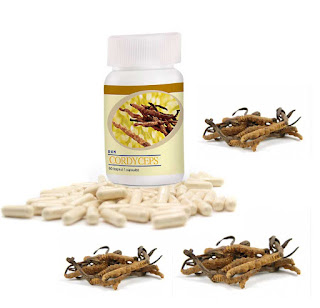BENEFITS OF CORDYCEPS
Hepatitis B:
Cordyceps may stimulate the immune system and improve serum gamma globulin levels in hepatitis B patients. Currently, there is insufficient evidence to recommend for or against the use of cordyceps for chronic hepatitis B. However, the results are promising. Additional study of cordyceps and current hepatitis treatments is needed.
Hyperlipidemia (high cholesterol):
Cordyceps may lower total cholesterol andtriglyceride levels, although these changes may not be permanent or long lasting. Longer studies with follow up are needed to determine the long-term effects of cordyceps on hyperlipidemia.
Anti-Aging:
Cordyceps may improve various symptoms related to aging. However, higher quality studies testing specific symptoms of aging are needed before the effects of cordyceps can be described. Currently, there is insufficient evidence to recommend for or against the use of cordyceps for anti-aging.
Cordyceps may reduce some asthma symptoms. Additional studies are needed to make a firm recommendation.
Bronchitis:
There is insufficient evidence from controlled clinical trials to recommend for or against the use of cordyceps for bronchitis. Most studies using cordyceps have found improved symptoms with cordyceps more than the control drugs. Although results are promising, more studies should be performed before a firm recommendation can be made.
Chemoprotective:
There is insufficient evidence to recommend for or against the use of cordyceps as a chemoprotective agent in aminoglycoside toxicity. However, the results are promising.
Exercise performance enhancement:
In 1993, two female Chinese athletes, who admitted using cordyceps supplements, beat the world records in the track and field competition at the Stuttgart World Championships for the 1,500-, 3,000-, and 10,000-meter runs. However, there is insufficient evidence from conflicting controlled clinical trials to recommend for or against the use of cordyceps for improving exercise performance. More studies are needed in this area.
Immunosuppression:
Two studies using combination herbal treatments that included cordyceps indicate that these combinations suppressed the immune system in kidney transplant and lupus nephritis patients. However, as these treatments used combination products, the effect of cordyceps cannot be defined. More studies with cordyceps as a monotherapy are needed.
Liver Disease (hepatic cirrhosis):
In traditional Chinese medicine, cordyceps has been used to support and improve liver function. In two studies using herbal combinations that included cordyceps, liver function improved liver and immune function. However, as these studies used combination treatments, the effect of cordyceps alone is unknown.
Renal failure (chronic):
In traditional Chinese medicine, cordyceps is used to strengthen kidney function. Two studies indicate that cordyceps may improve renal function in patients with chronic renal failure. More studies are needed to confirm these findings.
Cordyceps may benefit people at risk of diabetes. Researchers from University of Macau, China, isolated a polysaccharide of molecular weight approximately 210kDa was isolated from cultured Cordyceps mycelia. This isolated polysaccharides, CSP-1, has a strong antidant activity and a hypoglycemic effect on normal and alloxan-diabetic mice and streptozotocin (STZ)-diabetic rats. When administered at a dose of higher than 200mg/kg body wt. daily for 7 days, CSP-1 produced a significant drop in blood glucose level in both STZ-induced diabetic rats and alloxan-induced diabetic mice.
Researchers from China Agricultural University, Beijing, also noticed the blood glucose lowering effects of a polysaccharide extracted from the fruting bodies and mycelia of Cordyceps militaris in a study of rats. The hypoglycemic effect of this polysaccharide-enriched Cordyceps militaris extract was dose-dependent. Korean researchers showed a water-extract of Cordyceps militaris ameliorated insulin resistance by enhancing glucose utilization in skeletal muscles of rats.
Anti-oxidative Activities
Cordyceps has antioxidant activities. Researchers from Chia Nan University of Pharmacy and Science,
Taiwan, demonstrated the protective effects of cultured Cordyceps militaris and natural Cordyceps sinensis against oxidative damage of biomolecules in a vitro study. They both have free radical scavenging abilities.
Cordyceps may offer benefits to those suffered from certain cancers. The aqueous extract of Cordyceps sinensis (Cs), one of the traditional Chinese medicines, has been demonstrated to benefit a wide range of disorders in either animal or test-tube studies. Here are some most recent animal or in vitro studies suggesting its benefits in cancers.Korean researchers reported cytotoxic effects of cultivated fruiting bodies of Cordyceps militaris extracts against the proliferation of the human premyelocytic leukemia cell HL-60 via the activation of caspase-3.
Researchers from Nanjing University shouls that a polysaccharide extracted from a cultivated Cordyceps sinensis fungus significantly enhanced superoxide dismutase activity of liver, brain and serum as well as glutathione peroxidase activity of liver and brain in tumor-bearing mice. It also inhibited H22 tumor growth in the mice.
Hong Kong researchers demonstrated that an ethanol extract of cultivated mycelium of a Cordyceps sinensis fungal mycelium has strong anti-tumor activity on four cancer cell lines MCF-7 breast cancer, B16 mouse melanoma, HL-60 human premyelocytic leukemia and HepG2 human hepatocellular carcinoma. In an animal test, the EtOAc extract showed significant inhibiting effect on B16-induced melanoma in C57BL/6 mice, causing about 60% decrease of tumor size over 27 days. In contrast, this extract had much lower cytotoxicity against normal mouse bone marrow cells.
Cordyceps sinensis is believed to be an immunomodulator. Hong Kong researchers demonstrated that a cultivated strain of Cordyceps sinensis induced the production of interleukin(IL)-1beta, IL-6, IL-10 and tumor necrosis factor alpha alpha from PBMC, augmented surface expression of CD25 on lymphocytes in a vitro study. While, researchers from Zhejiang University, China, desmonstrated increased ovalbumin-specific IgG, IgG1 and IgG2b serum levels after treating the mice with edible mycelia of Cordyceps sinensis.
WATCH VIDEO FOR MORE DETAILS ...
(Explained: Dr. Titus Bantiles, M.D.)





No comments:
Post a Comment